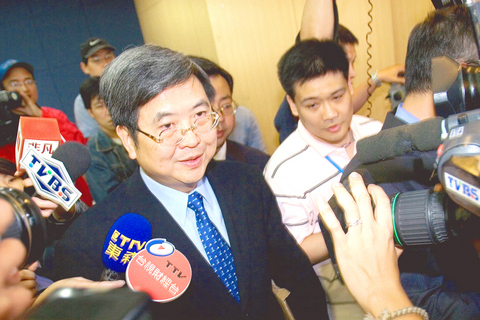Suspended Financial Supervisory Commission (FSC) Chairman Kong Jaw-sheng (
"I have been suspended and I will leave ... it is impossible for me to return to the post," Kong told reporters yesterday.
"I respect the Cabinet's decision. But I came in [to the position of FSC chairman] with a clean reputation and I hope to leave with one," Kong said.

PHOTO: AP
He repeated these sentiments several times during the press conference, but shied away from giving a date for his resignation.
Stressing that he held himself to high moral standards and had a clear conscience, Kong said: "I am in this situation today because I got in the way of certain interest groups as the head of an independent financial supervisor, whose duties always involve interests worth tens of billions of dollars."
The official, who said he was politically naive, declined to identify the "interest groups" to which he referred.
Looking solemn but tired, Kong made the remarks at a media briefing yesterday after three days of silence following the Cabinet's unexpected decision to suspend him late last Friday.
Kong was questioned for about 13 hours and released on bail of NT$500,000 (US$15,800) last Thursday by the Taipei District Prosecutors Office, which is investigating claims he conducted public business for private gain during his chairmanship at the state-run Taiwan Sugar Corp (Taisugar,
He was accused of awarding Taisugar's upscale cosmetics franchise to a certain company without going through the regulatory procurement process as well as bypassing government procurement requirements and hiring his sister-in-law as a paid consultant to the company's coffee shop business.
Kong was nominated to chair the FSC by the premier at the time, Yu Shyi-kun, and approved by President Chen Shui-bian (
As the position of FSC chairman has a four-year tenure, and the nation's highest financial regulator is supposed to be immune to political influence in order to safeguard the independent status of financial policy-making, some have questioned whether it is possible for Kong to be forcibly removed.
The confrontation between Kong and the Cabinet appeared to escalate yesterday as the government said it stood by its decision on Kong's suspension.
Premier Su Tseng-chang (
The ruling was made with prudence and legitimacy, and would not be changed, Cheng said, adding that the Cabinet expected Kong to make a "wise decision" as soon as possible.
Denying the allegations against him, Kong said it did not make sense that he would give up a well-paid job at an international investment banking business to make relatively small profits through corruption as a public servant on a much smaller salary.
Kong spent 20 years in the financial industry before entering the public sector, serving as a national manager for Credit Suisse First Boston and president of Lehman Brothers Holding Inc's Taiwan unit.
In light of recent developments, legislators are planning to amend regulations and set up a mechanism to dismiss corrupt officials who are in positions that enjoy political immunity.
Another such position of safety is that of governor of the central bank.

To many, Tatu City on the outskirts of Nairobi looks like a success. The first city entirely built by a private company to be operational in east Africa, with about 25,000 people living and working there, it accounts for about two-thirds of all foreign investment in Kenya. Its low-tax status has attracted more than 100 businesses including Heineken, coffee brand Dormans, and the biggest call-center and cold-chain transport firms in the region. However, to some local politicians, Tatu City has looked more like a target for extortion. A parade of governors have demanded land worth millions of dollars in exchange

Hong Kong authorities ramped up sales of the local dollar as the greenback’s slide threatened the foreign-exchange peg. The Hong Kong Monetary Authority (HKMA) sold a record HK$60.5 billion (US$7.8 billion) of the city’s currency, according to an alert sent on its Bloomberg page yesterday in Asia, after it tested the upper end of its trading band. That added to the HK$56.1 billion of sales versus the greenback since Friday. The rapid intervention signals efforts from the city’s authorities to limit the local currency’s moves within its HK$7.75 to HK$7.85 per US dollar trading band. Heavy sales of the local dollar by

Taiwan Semiconductor Manufacturing Co’s (TSMC, 台積電) revenue jumped 48 percent last month, underscoring how electronics firms scrambled to acquire essential components before global tariffs took effect. The main chipmaker for Apple Inc and Nvidia Corp reported monthly sales of NT$349.6 billion (US$11.6 billion). That compares with the average analysts’ estimate for a 38 percent rise in second-quarter revenue. US President Donald Trump’s trade war is prompting economists to retool GDP forecasts worldwide, casting doubt over the outlook for everything from iPhone demand to computing and datacenter construction. However, TSMC — a barometer for global tech spending given its central role in the

The Financial Supervisory Commission (FSC) yesterday met with some of the nation’s largest insurance companies as a skyrocketing New Taiwan dollar piles pressure on their hundreds of billions of dollars in US bond investments. The commission has asked some life insurance firms, among the biggest Asian holders of US debt, to discuss how the rapidly strengthening NT dollar has impacted their operations, people familiar with the matter said. The meeting took place as the NT dollar jumped as much as 5 percent yesterday, its biggest intraday gain in more than three decades. The local currency surged as exporters rushed to